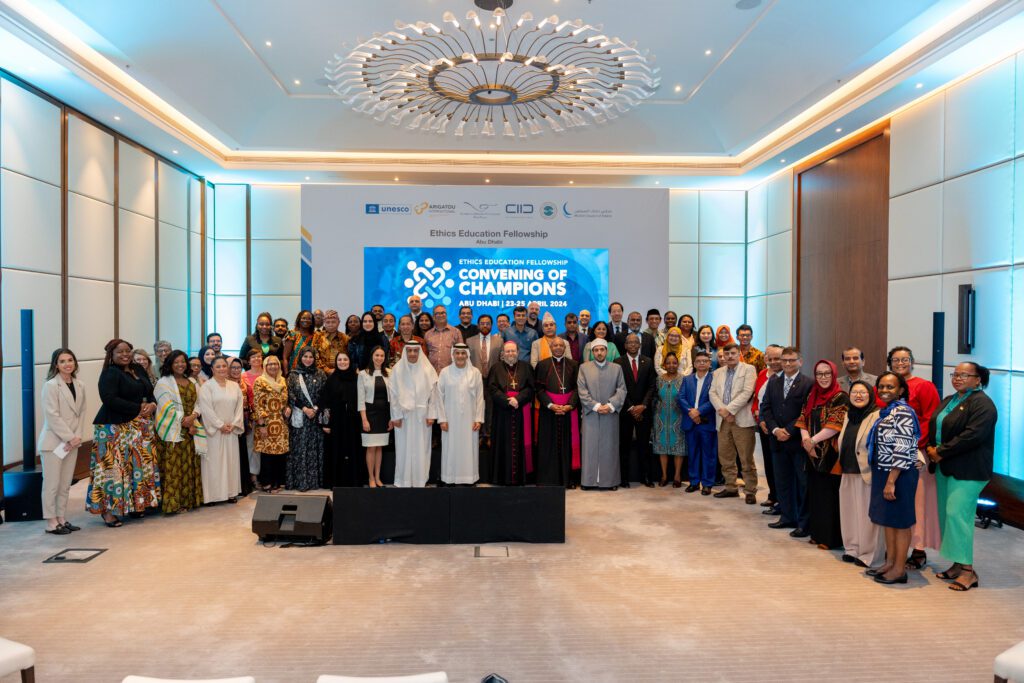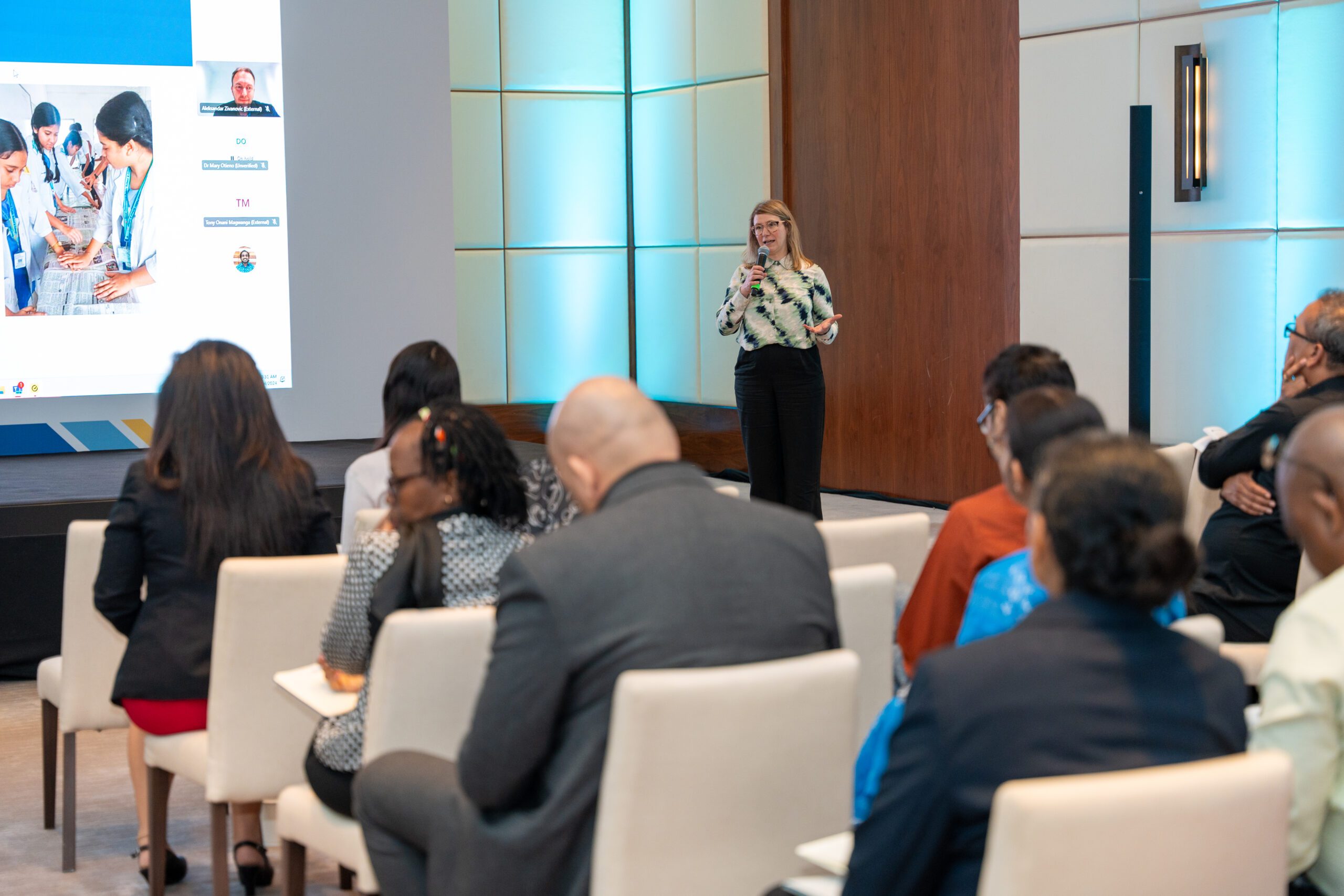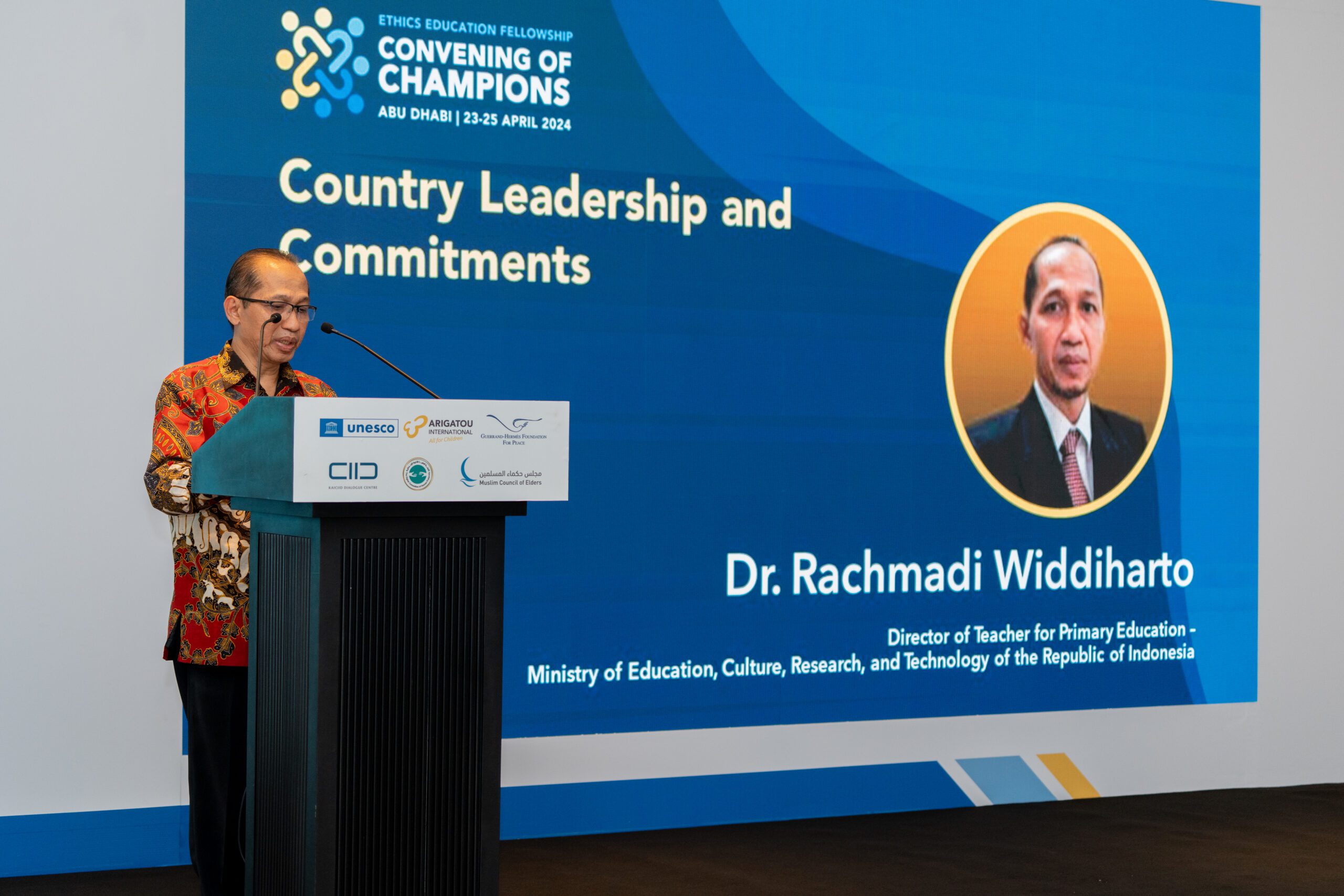
Held on 23-25 April 2024, the ‘Convening of Champions’ meeting marked a significant milestone in the Ethics Education Fellowship collaboration. The gathering was attended by 70 participants from 17 countries, including senior representatives from Ministries of Education, UNESCO offices, partner organizations, as well as religious leaders. The event served as a bustling hub for discussing the importance of prioritizing and investing in Ethics Education.
The event featured two days of technical discussions and strategic planning, followed by a one-day high-level segment. Held in Abu Dhabi, UAE, the meeting was co-hosted by the Muslim Council of Elders and the Higher Committee of Human Fraternity, together with Arigatou International, Guerrand-Hermès Foundation for Peace, KAICIID International Dialogue Centre, and UNESCO.
The meeting explored the Ethics Education Fellowship program’s transformative impact on children, teachers and the community. Launched in 2022 with the engagement of the Ministries of Education of Bangladesh, Indonesia, Kenya, Mauritius, Nepal and Seychelles, the program sought to contribute to global citizenship and to build inclusive and peaceful societies.
Throughout the three-day event, participants reflected on the critical role Ethics Education plays in the current context and how it can address the needs of children to support their holistic well-being. “An essential step in the road to peace is to ensure that every child grows up with full access to their innate capacity for spiritual development. This is why the implementation of interfaith ethics education both in schools and in other educational settings is so vital,” stated Mr. Hironari Miyamoto, in representation of Rev. Keishi Miyamoto, President of Arigatou International.

In the same vein, H.E. Dr. Ahmad Belhoul Al Falasi, Minister of Education of the UAE stated, “Our approach to education must ensure that our young people develop a core set of universal principles and values that reflect the shared experience of humanity that are relevant in any society.”
Representatives from the Ministries of Education shared invaluable insights drawn from their experiences implementing the program in the participating countries, which reached 324 teachers and benefited 8,034 children and youth. They showcased the excellent results of the program, discussed challenges and opportunities, explored its scalability and sustainability at the national level and looked into potential collaborations with diverse partners.
H.E. Dr. Justin Davis Valentin, Seychelles Minister of Education, remarked, “We took the Fellowship Program very seriously and it fits very well in our strategy of promoting value-based education. We are already experiencing great outcomes as a result of implementing ethics education within our school curricula.”
One of the event’s highlights was amplifying the voices of children and young people. Through video messages, children shared their learnings after participating in the program. Alice, a young student from Kenya explained how the program helped children in her class coexist more peacefully by appreciating the differences between ethnic groups. Similarly, Tia, a student from Seychelles said, “Ethics education is important for me because it showed me to learn more about me and others;” “Ethics Education also taught us to avoid racism, treat everyone equally and respect everyone’s precious opinion” added Warisa, from Bangladesh. Bernadeth from Indonesia stated that the activities were interesting and fun. “I learned how to make quick and wise decisions. I think it is important for my daily life,” she declared.
Calling for the Ministries of Education to continue and expand the program, Kumakshi, a student from Mauritius said, “I hope that ethics education will be introduced in all schools in Mauritius.” “All students should have the opportunity to get involved in ethics education programs,” reflected Krishna, from Nepal.

Country representatives made commitments to increase the investment and focus on Ethics Education in formal and non-formal education systems. They also stated their plans to integrate and mainstream Ethics Education to promote intercultural and interreligious learning and dialogue in the education curriculum, policies and programming across the education system. Participating countries’ plans include strengthening the capacity of formal education institutions and educators on Ethics Education through teacher training programs for pre- and in-service teachers.
“We have seen in these days concrete evidence of how ethics education contributes to foster the principles of human fraternity and interconnectedness, peaceful coexistence and solidarity, nurturing positive relationships and empowering learners to transform societies,” stated Dr. Khalid Al Ghaith, Secretary General of the Higher Committee of Human Fraternity, on behalf of the Secretary General of the Muslim Council of Elders, Judge Abdelsalam, as the event came to an end.
A full report of the event, including its main results, next steps, and the commitments from each country will be released soon. The recording of the high-level panel is available in this link.
We thank the ministries of education, and partners of the Ethics Education Fellowship, including the fellows, teachers and children, as well as the high-level panel speakers and attendants, for walking with us on this transformative journey towards integrating Ethics Education into children’s educational pathway.
[metaslider id=27467]